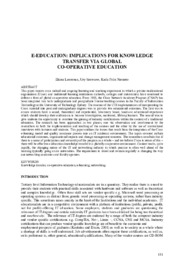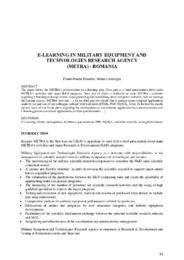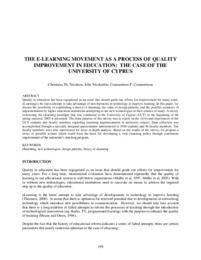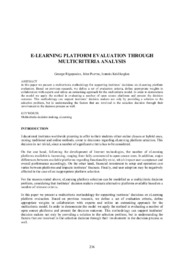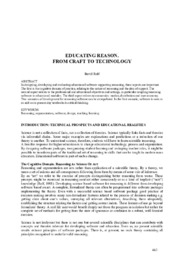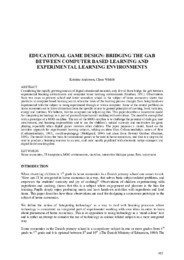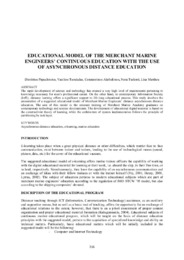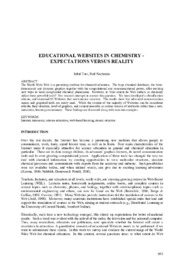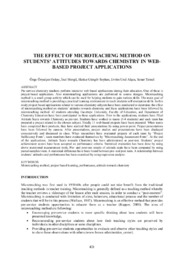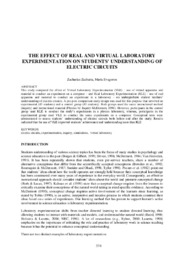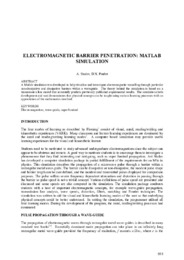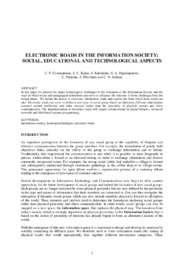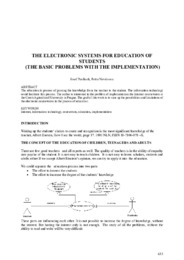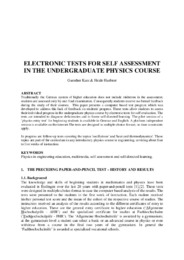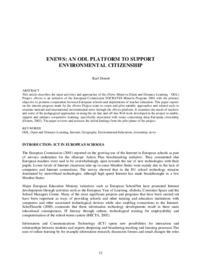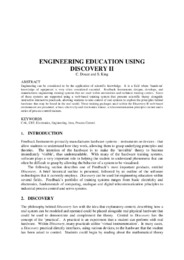Browsing Computer Based Learning in Science (CBLIS) by Title
Now showing items 82-101 of 337
-
E-education: implications for knowledge transfer via global co-operative education
(Department of Educational Sciences, University of Cyprus, 2003)This paper reports on a radical and ongoing learning and teaching experiment in which a private multinational organization (Cisco) and traditional learning institutions (schools, colleges and universities) have combined ... -
An e-learning framework For wound image understanding
(University of Cyprus, 2007)This paper presents a Java based e-learning framework for analyzing, processing and understanding wound images, to be used in teaching, learning and research activities. We intend to promote e-learning technologies in medical, ... -
E-learning in military equipment and technologies research agency (metra) - Romania
(Department of Educational Sciences, University of Cyprus, 2003)The paper shows the METRA's achievements in e-learning area. First part is a brief presentation about main METRA’s activities and major R&D programs. Next part of paper is dedicated to main METRA’s activities regarding ... -
The e-learning movement as a process of quality improvement in education: the case of the University of Cyprus
(Department of Educational Sciences, University of Cyprus, 2003)Quality in education has been regognized as an issue that should guide our efforts for improvement for many years. eLearning is the latest attempt to take advantage of developments in technology to improve learning. In ... -
E-learning platform evaluation through Multicriteria analysis
(University of Cyprus, 2007)In this paper we present a multicriteria methodology for supporting institutes’ decisions on eLearning platform evaluation. Based on previous research, we define a set of evaluation criteria, define appropriate weights ... -
Ecologies of parental engagement and preservice science teacher education: the design and development of a multimedia case-based environment “p a r e n t s”
(Department of Educational Sciences, University of Cyprus, 2003)The purpose of this paper is to present the rationale and principles that guided the design and development of a multimedia case-based environment, called PARENTS. Following a development research approach, the tenets of ... -
Educating reason. From craft to technology
(Department of Educational Sciences, University of Cyprus, 2003)In designing, developing and evaluating educational software supporting reasoning, three aspects are important. The first is the cognitive domain of practice, relating to the nature of reasoning and the idea of support. ... -
Educational game design: bridging the gab between computer based learning and experimental learning environments
(Department of Educational Sciences, University of Cyprus, 2003)Considering the rapidly growing amount of digital educational materials only few of them bridge the gab between experimental learning environments and computer based learning environments (Gardner, 1991). Observations from ... -
Educational model of the merchant marine Engineers’ continuous education with the use Of asynchronous distance education
(University of Cyprus, 2007)The rapid development of science and technology has created a very high level of requirements pertaining to knowledge necessary for man’s professional career. On the other hand, in contemporary Information Society (InfS), ... -
Educational software on the ozone layer Depletion
(University of Cyprus, 2007)This paper describes the design and the formative evaluation of educational software concerning the ‘Depletion of the Ozone Layer’ designed for the students of the Faculty of Primary Education (pre-service teachers) of ... -
Educational websites in chemistry - expectations versus reality
(Department of Educational Sciences, University of Cyprus, 2003)The World Wide Web is a promising medium for chemical education. The huge chemical databases, the threedimensional and dynamic graphics together with the computational and communicational power, offer exciting new ways to ... -
The effect of microteaching method on Students’ attitudes towards chemistry in webbased Project applications
(University of Cyprus, 2007)Pre-service chemistry teachers perform intensive web-based applications during their education. One of these is project-based application. Also microteaching applications are performed in course designs. Microteaching method ... -
The effect of real and virtual laboratory experimentation on students’ understanding of electric circuits
(University of Zilina, 2005)This study compared the effect of Virtual Laboratory Experimentation (VLE) - use of virtual apparatus and material to conduct an experiment on a computer - and Real Laboratory Experimentation (RLE) - use of real apparatus ... -
Efficient e-learning services
(University of Zilina, 2005)The contribution deals with the architecture of the eEDUSER portal (eEDUSER - ”Efficient E-Learning Network Services Establishment for Education without Borders”, project within Leonardo da Vinci Programme). It analyses ... -
Electromagnetic barrier penetration: matlab Simulation
(Department of Educational Sciences, University of Cyprus, 2003)A Matlab simulation was developed to help visualise and investigate electromagnetic tunnelling through particular non-dissipative and dissipative barriers within a waveguide. The theory behind the simulation is based on a ... -
Electronic roads in the information society: social, educational and technological aspects
(Department of Educational Sciences, University of Cyprus, 2003)In this paper we present the major technological challenges to the formation of the Information Society and the ways in which social and pedagogical restrictions can serve to influence the outcome of those challenges from ... -
The electronic systems for education of students (the basic problems with the implementation)
(Department of Educational Sciences, University of Cyprus, 2003)The education is process of passing the knowledge from the teacher to the student. The information technology could facilitate this process. The author is interested in the problem of implementation the Internet coursewares ... -
Electronic tests for self assessment in the undergraduate physics course
(Pedagogical Faculty of University of Ostrava, 2001)Traditionally the German system of higher education does not include midterms in the assessment; students are assessed only by one final examination. Consequently students receive no formal feedback during the study of ... -
Enews: an odl platform to support environmental citizenship
(Department of Educational Sciences, University of Cyprus, 2003)This article describes the main activities and approaches of the eNews Minerva (Open and Distance Learning - ODL) Project. eNews is an initiative of the European Commission SOCRATES Minerva Program 2001 with the primary ... -
Engineering education using Discovery II
(Pedagogical Faculty of University of Ostrava, 2001)Engineering can be considered to be the application of scientific knowledge. It is a field where ‘hands-on’ knowledge of equipment is very often considered essential. Feedback Instruments designs, develops, and manufactures ...
